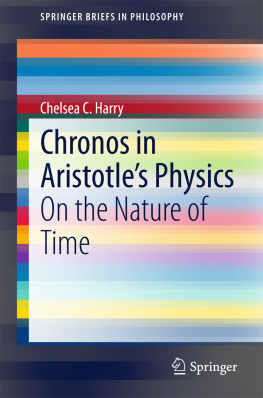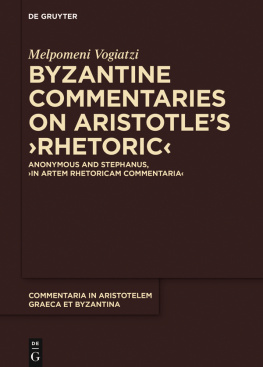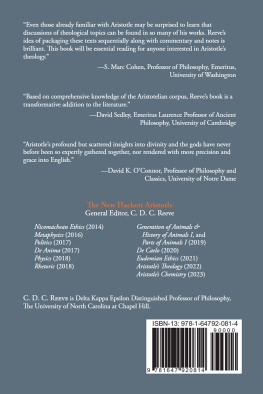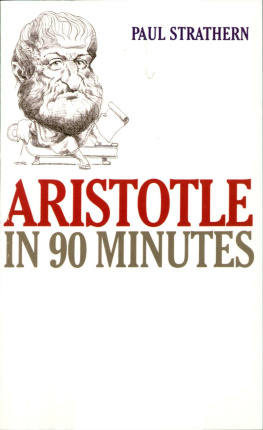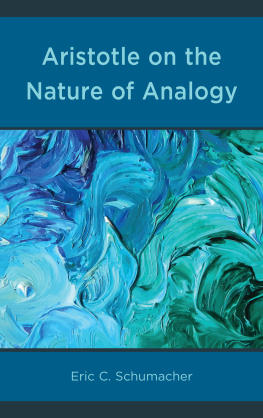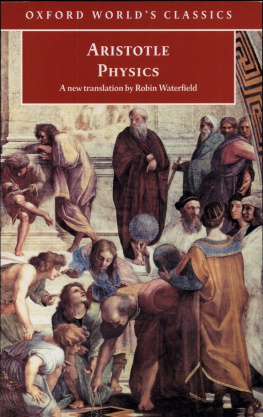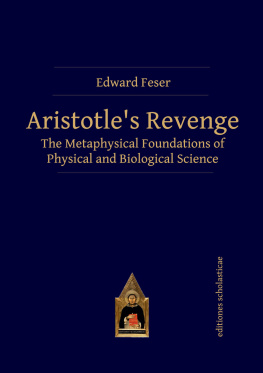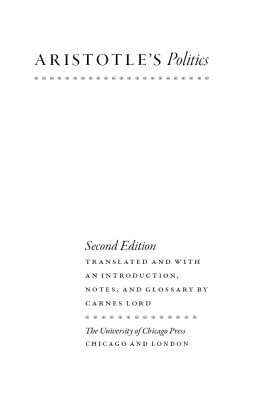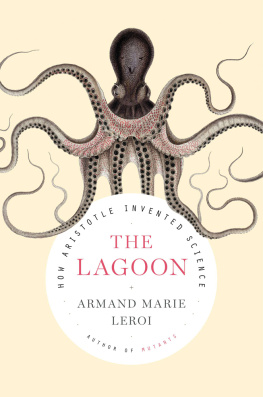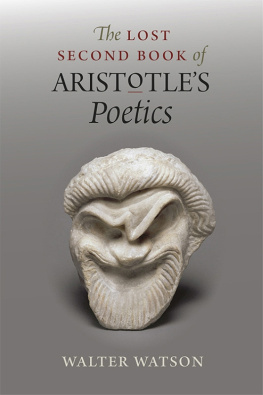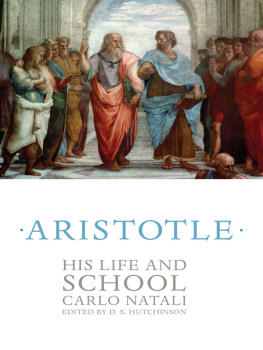Aristotle was not a philosopher concerned with time in questions about time or in delimiting the being of time.
Thinking backward, time ( chrnos ) is an attribute of motion or change, ( kinsis ), for Aristotle (219b12). Aristotles interest in time and in that which is supposedly required in order that there be motion, e.g., infinity, place, and void (200b12), come from his interest in motion itself, and motion only because he sought in the Physics comprehensive understanding of the fundamental principles of natural beings . His analysis of time, then, comes from his interest in the study of natural being. If we can read Aristotles account of time in this way, then we will be able to see that his account of time cannot be an account of time qua time.
In this chapter, I begin with a careful reading of Physics i 1, emphasizing the importance of acquiring a sense for the scope , goals, and method of Aristotles project as preparatory to reading subsequent arguments in the work. In particular, I propose that, contrary to the typical polarized readings of this section, Aristotles method in the Physics is necessarily a combination of dialectic, beginning with endoxa , and demonstration, beginning from experience. I then continue my reading of book 1, highlighting the potentiality ( dunamis )/actuality ( entelecheia ) distinction in Aristotles account of natural change, gignomenon and kinsis , in substantial natural beings . I suggest that this distinction is quite important for Aristotles conclusions about the principle of natural beings in Physics ii (192b1322) and that understanding these conclusions entails that the potentiality /actuality distinction is preparatory to a full reading of the definition of motion Aristotle advances in Physics iii 1 (201a1011) and to his subsequent explanations of the infinite (iii 48), place (iv 15), void (iv 69), and especially time in the Physics . Namely, Aristotle is going to argue that the natural scientist must think radically differently about the ontological status of motion and the terms of motion, i.e., they are not self-subsistent natural beings . The following chapter will thus be divided into the following subsections: (1) Physics : Scope , Access, Goals, and Method ; (2) Nature and its Archai ; (3) The Role of Kinsis in Nature; (4) From Kinsis to Chrnos .
1.1 Physics : Scope, Access, Goals, and Method
Aristotles Physics is a book about nature (, phusis ). It is an inquiry into nature itself, but this means an inquiry into the objects of nature in so far as these objects seem to reveal what nature is, i.e., the principle of their motion.
The first line of Physics i 1 introduces the scope of the project: When the objects of any inquiry ( ), in any department, have principles (), causes (), or elements (), it is through acquaintance with these that knowledge and understanding is attained (184a1012). Aristotles goal is not a subjective objective to overcome skepticism; rather, he is searching for comprehensive understanding. Instead, his subject must be the nature of the various natural beings . The objects of nature can be investigated, probed, and analyzed for the grasp of the natural principle involved in each kind of natural being.
Aristotle continues, announcing that the first task in the present inquiry, which he names a science of nature ( ), will be to determine what relates to its principles ( ) (184a1516). The question here at the beginning of the Physics is not only about the scope of inquiry, but also about access to the subject. To know the principles, one must make a determination about what concerns them. Aristotles point here is subtle, but if acquaintance with the principles, causes, and elements of natural beings is the scope, and if comprehensive understanding is the goal, the natural scientist must have both (1) the potentiality for perception of that which concerns the principles of nature, and (2) a faculty of judgment in order to acquire knowledge of them.
Scope and access must be buttressed by a clear method . Aristotle famously outlines a method, but what exactly he intended to convey is disputed. He will gather knowledge of these principles moving from what is better known to us to what is better known by nature ( ) (184a16). On one reading, what is better known to us may mean endoxa , or those ideas that are commonly held. On this reading, the method Aristotle proposes is dialectic (see also Topics viii 5), and the ideas about nature whence he would be starting would have been those advanced by his predecessors, e.g., Plato, the atomists, the sophists, and the Eleatics. or is he a natural scientist, looking for clear demonstration of the nature of natural beings ? Having left this question unanswered, and indeed unasked, some modern readers have supposed that Aristotles Physics is inconsistent in methodchanging between metaphysics of nature and an epistemology.
As was aforementioned, the potential for perception and judgment are both pertinent to achieving the goals Aristotle has laid out. If sense perception is indeed integral to the project, he is going to acquire knowledge of the nature of natural beings at least in part by way of demonstration. Consider, for example, Aristotles general account of perception and knowledge in De anima ii 5 (417b1728) where he asserts that scientists must have access to external perceptibles in order to acquire knowledge of things generally. Because there is no one place to start an inquiry into nature when the subjects of the inquiry exist external to the scientist, with what the scientist begins her inquirywith endoxa or confused perceptionsshould not be a disjunction. Instead, it should be a conjunction; the two are inextricable in natural science.
Aristotle provides further detail about his method . These paragraphs are notoriously difficult to interpret because Aristotle uses the terms universal and particular equivocally. Since he has just insisted that we begin with things more knowable to us, he then qualifies this point saying: For the same things are not knowable relatively to us and knowable without qualification ( ) (184a18). his conclusion that his method will: advance from what is obscure by nature, but clearer to us ( ), towards what is more clear and more knowable by nature ( ) (184a1921), means that the scientist will begin with the individual natural beings whose general nature she wants to know better. If, however, Aristotle meant that we begin with ideas commonly held, then the conclusion announced about his method entails working from the ideas of predecessors. In this case, the method does not clearly involve scientific observation or investigation.
Aristotle adds here that we will get at the first principles by starting with rather confused masses ( ) (184a22), or, as Ross renders it, the confused data we start with (Ross 1936, 15), and by subsequent analysis, we will achieve the anticipated elements and principles ( ) (184a22). Again, one could understand confused masses to mean either endoxa or first perceptions and analysis to refer to dialectic or demonstration. But, what Aristotle writes next points us to the latter explanation. He clarifies that we first come to know universals () and then particulars. Of course, universal is used here in a sense different from the one just discussed, i.e., universal as genera. Here, universal refers to a whole, and that is contrasted with particular, meaning part of the whole. These universals, or wholes, are better known to sense than particulars ( , ) (184a23). What is better known to us, then, is what is better perceived by us; and, wholes are perceived before parts. To illustrate this point, Aristotle uses the example of the child first associating the name father with all men and then later determining that only one of those men is his own father. Similarly, a child learns dog, cat, chair, table, and only over time learns what distinguishes one instance of these universals from another. The demonstrative, that cat or this chair develops into a more specific identification: the Adirondack Chair my grandfather owned or the black Labrador Retriever named Wolfgang. Even as adults, when we first experience objects, we do not immediately distinguish among various instantiations of them. We see a starling for the first time, and subsequent sightings of different starlings are indistinguishable from the first.

